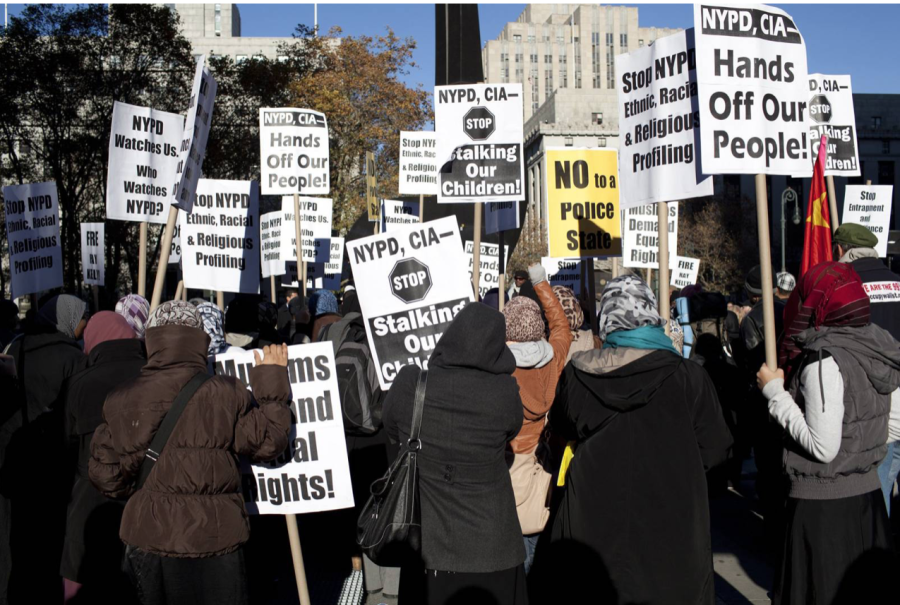FBI v. Fazaga: America’s Foreign Policy on Trial
New York protesters hold signs to fight against the surveillance of Muslims as they walk down New York City’s streets. Many believe that the government treats Muslims as “second-class citizens” since the 9/11 attacks.
Following the horrific events of 9/11, PL 107-56, The Patriot Act was signed into law on October 26, 2001, by the 43rd U.S. President, George Bush, expanding the government’s powers of surveillance. Reputedly, the Act also increased the number of informants used to record information even years after the attacks.
The ratification of this Act was very controversial among the American people and some viewed it with distaste. It’s estimated that over 970 potential extremists have been charged by the Department of Justice since the 9/11 attacks and that the majority of the persecuted had never even come close to executing an act of violence.
Over one-third of those cases involved informants and were solved by the Federal Bureau of Investigation, better known as the FBI, with the expansion of The Patriot Act. Many civil rights activists believe that the Patriot Act was unjustly aimed at Muslims and their Islamic religion.
“The Gallop Center estimates that 55% of Muslims say that life after 9/11 became more difficult,” history teacher Ron Cordell stated. “The nation in many respects is still reeling from the events of 9/11. That event and all that has followed remain emotionally charged for those living at the time it took place. We feel less secure and less safe.”
A recent study shows that there has been a dramatic spike in Islamophobic assaults since the 9/11 attacks as well as an increase in government surveillance in the U.S.
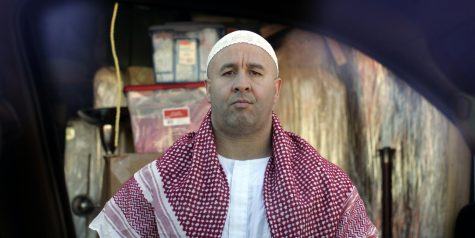
Between 2006 and 2007 the FBI held surveillance against Islamic religious centers in Southern California. Allegations state that surveillance was held for at least eighteen months with the use of a confidential informant, Craig Monteilh, who secretly recorded private conversations between the members of the mosque.
From July of 2006 until October of 2007, Monteilh was sent by the FBI to pose as a convert to over six mosques around Southern California. This project was named “Operation Flex,” a pun to his fake identity; a fitness trainer.
“This was a massive undertaking for the FBI,” Monteilh said. “It was an experiment, that’s what they called it, to see if I could actually fool an entire community. I’m a white guy, right? My backstory was that my mother was Syrian. My father was French. My father suppressed our religious heritage on my mother’s side.”
He was successful and able to record members praying in the mosque sanctuary by inserting a small recording device into his car key fob. He documented hundreds of both audio and video discussions and helped the FBI to listen in on private conferences between the congregants and their spiritual advisors.
Over those eighteen months, the informant gathered members’ names, phone numbers, e-mails, history, both political and religious views as well as their future plans. However, he failed to receive any threats of terrorism or thoughts of criminal activity.
In 2006, Hussam Ayloush, the executive director of the Council on American-Islamic Relations’ Los Angeles branch, started to receive phone calls from many of the Muslim community members in Southern California. All of the calls entailed a supposed fitness consultant, Farouk al-Aziz aka Craig Monteilh.
The citizens claimed that Aziz would walk up to young men who were attendants at community mosques. He would start the conversation by giving the men random workout tips and how to gain more muscle until eventually, he began asking unusual questions concerning jihad.
A few months later, Monteilh went to the extremes by suggesting to two of the Muslim mosque members that “we should bomb something.” Ayloush received a call from the two citizens about the proposal, leading him to call the FBI’s Los Angeles’ office. He informed the officers that he believed there was a potential terrorist in the community.
However, the tones of the agents seemed to be unresponsive to Ayloush and were intending to hang up the call before he could even finish giving them Aziz’s name and address. Ayloush began to grow suspicious when the FBI continued to do nothing about the potential terrorist in their community even weeks after his phone call.
Eventually, Monteilh had an altercation with the FBI and was sent to serve time in prison on criminal charges. When he was released in 2008, he wanted revenge.
In his own living room, Monteilh hosted a press conference with his local media, exposing “Operation Flex.” In the meeting, he accused the FBI of spying on Muslim communities without any evidence of potential crimes.
At first, the FBI denied that they had been surveilling Muslim communities. However, in 2009, they withdrew their previous statement and admitted that they had in fact hired Monteilh as an informant. Ayloush then learned of Aziz’s real identity; Craig Monteilh and realized that he had notified the FBI about an FBI informant.
When the truth about Monteilh became public knowledge, it had a reeling effect on what Islamic worshippers displayed in public. Many stopped attending group prayers and events held at their local mosques.
“People who stopped coming to the mosque, they didn’t tell us—they just disappeared,” Ayloush said. “People were afraid.”
Muslim parents were concerned about their children meeting with the Muslim Student Associations on college campuses or being politically opinionated. Local imams were alerted to cut talk of social justices from their sermons by their board of directors as well.
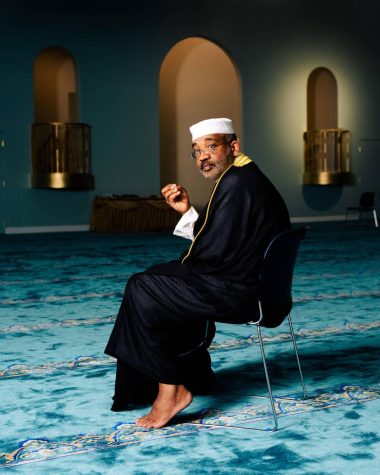
Religious leader of the Orange County Islamic Foundation in Mission Viejo, Sheikh Yassir Fazaga, began to feel hesitant when a worshipper would come to have a discussion with him.
“I would wonder if this is a genuine question, [if] somebody really want[ed] to know about these topics or if this is just somebody trying to get me to say stuff,” Fazaga said. “The constant distrust was exhausting.”
After being sick and tired of the constant state of fear of being spied on, Fazaga, along with two other congregants, Ali Udden Malik and Yasser AbdelRahim, decided to respond. With the help of the American Civil Liberties Union (ACLU) of Southern California, the Council for American-Islamic Relations’ Los Angeles (CAIS), and the law firm Hadsell Stormer Keeny Richardson & Renick LLP, Fazaga filed suit to the District Court of Southern California in February 2011.
They claimed that the FBI’s activity infringed on the U.S. Constitution as well as federal laws, such as the Foreign Intelligence Surveillance Act (FISA). They asserted that the FBI targeted them based solely on their religious practices and beliefs, demanding that the FBI demolish all the information they obtained as well as pay reparations to members of the community who were unlawfully investigated.
“It’s not the fear of what they might find out [that made me want to file a lawsuit],” Fazaga said. “It’s the fact that you’re violated—and you’re violated in the place where you are supposed to feel the safest.”
The ACLU also contacted Monteilh and convinced him to provide testimony as a witness to their case. According to Monteilh’s testimony, he had targeted Fazaga’s center because it was a “definite hotspot.”
The FBI thought of Fazaga to be an extremist.
“[Fazaga] directed students on how to conduct demonstrations and encouraged them to speak out,” Monteilh stated.
However, Monteilh told the court that he never suspected Fazaga to be dangerous.
“[I] never observed anything that gave [me] any reason to believe that Fazaga or any of the congregants or leadership of OCIF were involved in violence or terrorism in any way,” Monteilh stated.
In his testimony, Monteilh stated that he was pushed by the FBI to not only record and gain as much information as possible but also to keep an eye on specific people.
“[I was told to watch] anyone who studied Islamic law, openly criticized U.S. foreign policy, was an imam or sheikh, went on a holy pilgrimage to Hajj or played a leadership role in the mosque or Muslim community,” Monteilh said.
Monteilh declared that the FBI even requested that he have physical intercourse for the case.
“[They suggested I have] sexual relationships with women in the Muslim community for the purposes of information gathering,” Monteilh said.
“They said, if it would enhance the intelligence, go ahead and have sex, so I did,” Monteilh stated in “The ex-FBI informant with a change of heart: ‘There is no real hunt. It’s fixed’.”
However, Monteilh announced that he had no regrets about participating in “Operation Flex.”
“I don’t like how civil rights were violated, but I believed it was a necessary evil,” he stated. “The mission was important to gain valuable intel [and reveals how] state secrets [have] been abused as a trump card to get cases dismissed on a high level.”
In defense against the claims, the FBI argued that the information they acquired could and would be withheld by the state secrets privilege, empowering them to conceal knowledge from judicial proceedings. Due to this, the government stated that they could not defend themselves in court and that the case should be discharged. The District Court of Southern California agreed with the FBI and disregarded the plaintiffs’ allegations.
However, the Court of Appeals for the Ninth Circuit disagreed with the District Court’s decision to end the case and picked up the lawsuit. They then ordered the District Court to review the plaintiffs’ claims on the FBI’s religious discrimination by studying the methods that were authorized by Congress regarding the Foreign Intelligence Surveillance Act.
The FBI then appealed to the Supreme Court to evaluate the Ninth Circuit’s verdict, to which they agreed. In September 2021, the Court-Appointed Counsel (CAC), arranged a friend-of-the-court brief to support the plaintiffs.
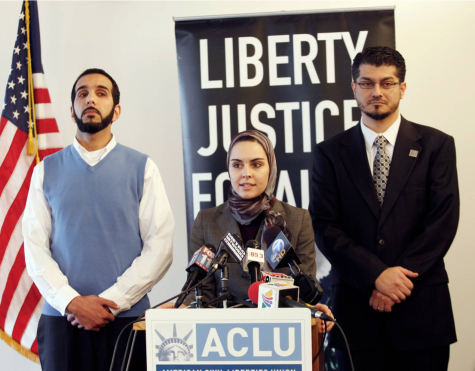
“The supreme court is not a normal court, it has a different structure and purpose,” AP Government teacher Charity Fisher said. “They are very selective in the cases they take, they’re looking for big Constitutional principles…they’re looking for dispute, that there’s been an inconsistency in judgements… they’re taking the types of cases where they want to establish how we deal with this issue, they want to have uniformity.”
After being granted the chance to speak with the Supreme Court, Fazaga remains hopeful that they will rule in their favor.
“As the Imam of the Orange County Islamic Foundation, I worked diligently to establish trust between my community and the U.S. government after the horrifying attacks of September 11 more than 20 years ago. I invited the FBI to speak with the members of my Mosque. They looked us all in the eyes and assured us unequivocally that they were not spying on us. We trusted them. But they lied, and our sacred community was shaken to its core,” Fazaga stated. “I hope and pray the Supreme Court will allow us to hold them accountable for treating people who practice Islam as second-class citizens.”
On November 8, 2021, the Supreme Court heard the oral argument of FBI v. Fazaga, regarding the central question of the case: “Does Section 1806(f) of the Foreign Intelligence Surveillance Act of 1978 displace the state-secrets privilege and authorize a district court to resolve the merits of a lawsuit challenging the lawfulness of government surveillance by considering the privileged evidence?”
The hearing began with Deputy Solicitor General Department of Justice, Edwin Kneedler, arguing on behalf of the Federal Government. In his argument, he defended the government’s state-secrets privilege by stating that in this case, it is “critical to safeguarding the national security.”
Kneedler then went on to argue that a district court judge should also not be able to privately view the information acquired through the FBI’s surveillance.
“[It] displaces the state-secrets privilege and requires the district court to adjudicate the merits of [the accusers’ allegations],” Kneedler argued.
He further backed up his argument by stating that section 1806(f) of the FISA was only provided for the probability that the government is planning to use the evidence they have obtained in a way of suppression and with the intention of using it against someone.
The majority of the justices were questioning if section 1806(f) was really as narrow as Kneedler suggested. Justice Neil Gorsuch responded to Kneedler’s claim with a counterargument.
“I think there’s a pretty good argument on the other side that the government is using [the information] as a means to dismiss the case without disclosing it,” Gorsuch stated. “That’s using the evidence as an offensive weapon.”
With many of the justices already wondering what the effects of their ruling would be on the individual FBI agents involved in this case, next up was attorney Catherine Carroll, arguing on behalf of the individuals. Carroll claimed that it would be cruel if they granted the plaintiff’s assertions to be ruled under the Ninth Circuit’s decision since it would block the individual agents from having their defendants be able to create an argument that lies within the honored information.
Her hearing then ended briefly, with many of the justices seeming to be in agreement. Last up was attorney Ahilan Arulanantham, arguing on behalf of Yassir Fazaga. Arulanantham began his case by declaring that the defendants “seek not to just exclude information but also dismiss it.”
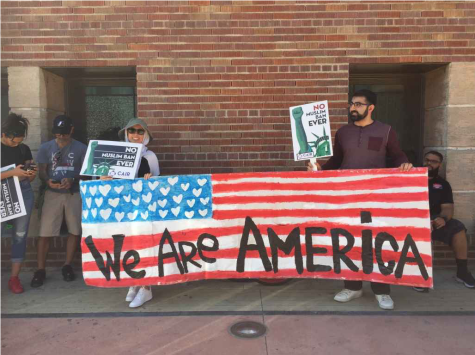
He then went on to argue that the government is in fact using the information.
“The defendants have a legitimate interest in defending themselves [but] that requires the court to review the information to determine if the surveillance was lawful,” Arulanantham claimed. “Relying on information to win dismissal in a lawsuit obviously is using the information.”
Continuing with his argument, Arulanantham declared that the withheld information should be released to the plaintiffs to improve their argument.
“We are entitled to that opportunity, whether under the FISA or under common law,” Arulanantham stated.
Chief Justice John Roberts then responded to Arulanantham’s claim that the government seems to be using their state-secrets privilege rather than using the information.
“What they are using, it seems to me, is privilege. They are not using the information. The whole point of this statutory provision in 1806 is to keep the information from being used. I think it makes more sense to talk about the using of the privilege,” Roberts said.
To which Arulanantham responded, “The motion makes no sense without the references to the information. They are using both…not just to keep it out, but also to win dismissal on religion claims. That is when it is of use.”
After debating on this topic for quite a while, Justice Amy Barret claimed, “The suit is about whether the surveillance violated or discriminated on the basis of religion…related documents show there was no religious discrimination, it was based on very good evidence that the targets were terrorists.”
Barret continued to show her worries to the individual FBI agents if the results do fall in Fazaga’s favor. Arulanantham then acknowledged that in a case involving the FBI, government workers will be included either way. By the end of the case, Arulanantham concluded his argument with a tone of hopelessness responding to Barret.
“If you’re talking about the mirror image problem, do you let the harm of the due process problem you’re talking about…fall on this side of the ledger or our side of the ledger, we’re out of luck even if they blatantly broke the law,” Arulanantham stated.
The expected scenario is that the case will return to the lower courts for additional hearings. The justices seem to want to avoid having to announce whether the FBI’s actions did break section 1806(f) of the FISA. However, it is still a possibility for the plaintiffs’ argument to continue on, even if the Ninth Circuit’s decision is terminated. A final decision from the Supreme Court is expected by the summer of 2022.


